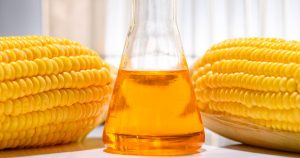December 4, 2024 from GEN News

High-fructose corn syrup (HFCS), a common sweetener derived from corn starch, is widely used in processed foods. From soft drinks to pasta sauces, salad dressings, and even ketchup, it is difficult to avoid. However, new research suggests that HFCS may have unintended health consequences—specifically, it could contribute to cancer growth by altering the body’s metabolism.
A study published in Nature, conducted by researchers at Washington University School of Medicine, sheds light on how fructose affects tumor development. The findings indicate that while cancer cells do not directly use fructose as fuel, the liver converts it into substances that promote tumor growth.
How Fructose Impacts Tumor Growth
For years, scientists have debated whether fructose plays a role in cancer development. Some research suggested that tumors might use fructose as an energy source, similar to glucose. However, this new study challenges that notion, revealing a more complex metabolic process at play.
The research team, led by Dr. Gary Patti, discovered that fructose consumption does not directly feed tumors. Instead, the liver metabolizes fructose into a variety of lipids, including lysophosphatidylcholines (LPCs). These lipids then circulate in the bloodstream and become readily available for cancer cells to absorb and use for growth.
“Our initial expectation was that tumor cells metabolize fructose just like glucose,” said Dr. Ronald Fowle-Grider, a postdoctoral fellow in Patti’s lab. “We were surprised that fructose was barely metabolized in the tumor types we tested. The tumor cells alone don’t tell the whole story—equally important is the liver, which transforms fructose into nutrients that tumors can use.”
A Closer Look at the Study Findings
To investigate the impact of fructose on tumor growth, researchers conducted a series of experiments on mice with melanoma, breast cancer, and cervical cancer. The results were striking:
- Tumors grew significantly faster in animals that consumed a diet high in fructose.
- Despite the rapid tumor growth, body weight, fasting glucose, and insulin levels remained unchanged.
- When fructose was fed to isolated cancer cells in a lab dish, the cells did not grow faster, confirming that the liver plays a key role in the process.
Further analysis using metabolomics revealed that hepatocyte (liver cell) metabolism of fructose resulted in a surge of LPCs in the bloodstream. These lipid molecules were then absorbed by cancer cells and used to build new cell membranes, allowing tumors to expand more rapidly.
“In some cases, the growth rate of the tumors accelerated by two-fold or even higher,” Dr. Patti noted. “Eating a lot of fructose was clearly very bad for the progression of these tumors.”
What This Means for Cancer Patients and Prevention
The study raises important questions about the role of diet in cancer progression. While the research was conducted in animal models, the findings suggest that limiting fructose intake could be beneficial for individuals with cancer.
“If you are unfortunate enough to have cancer, then you probably want to think about avoiding fructose,” Dr. Patti advised. “Sadly, that is easier said than done, as high-fructose corn syrup is found in so many processed foods.”
Beyond dietary changes, the researchers believe their findings could lead to new cancer treatment strategies. By targeting how the liver processes fructose, future therapies may be able to disrupt the supply of tumor-promoting lipids.
“An implication of these findings is that we do not have to limit ourselves to therapeutics that only target disease cells,” Dr. Patti explained. “We can think about targeting the metabolism of healthy cells to treat cancer.”
Currently, the research team is working with clinical partners at Washington University School of Medicine to explore the potential for a clinical trial.
Food for Thought
The growing body of research on high-fructose corn syrup and its effects on the body highlights the importance of mindful eating. While more studies are needed to fully understand the implications for human health, the latest findings suggest that fructose does more than just add sweetness—it may also contribute to cancer progression in unexpected ways.
For those looking to reduce their fructose intake, checking food labels and opting for whole, unprocessed foods may be a practical step toward better health.
Considering an IME or document review to resolve an insurance claim, legal file, or workplace health and safety issue?
Our specialists provide evidence-based opinions, so get in touch with Western Medical today to learn more about our services.

